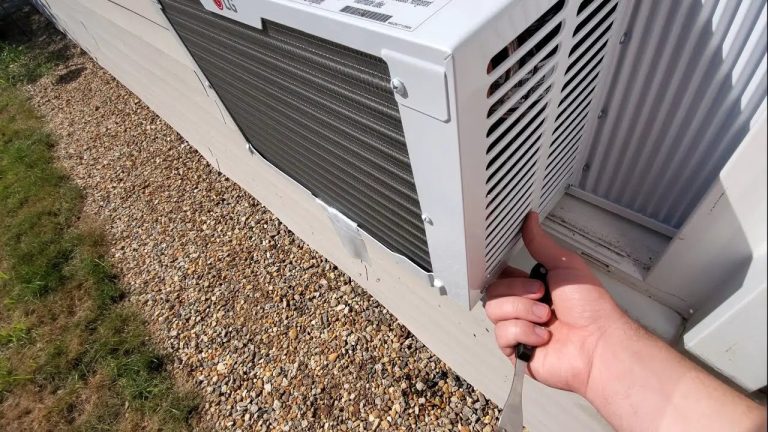Is Air Conditioner Gas Or Electric? Exploring The Key Differences
Air conditioners are primarily electric. In the past, they used gas, specifically ammonia, which was dangerous. However, as technology advanced, electric air conditioning became safer, more practical, and more popular due to improved safety, ease of use, and affordability. Today, the vast majority of air conditioners are electrically powered.
Air conditioning has become an indispensable part of modern life, providing comfort and relief from sweltering heat. But have you ever wondered what powers these cooling marvels? Is air conditioner gas or electric? It’s a question that often perplexes homeowners and renters alike as they navigate the world of cooling systems.
Understanding the key differences between gas and electric air conditioners is essential for making informed decisions about home appliances, energy efficiency, and cost-effectiveness. Let’s take a step back in time and consider the humble beginnings of air conditioning.
In the early 20th century, air conditioners relied on a gas called ammonia to cool the air. However, this system was fraught with danger, as leaks could lead to deadly consequences. As technology progressed, a safer and more practical alternative emerged: electric air conditioning.
Today, the vast majority of air conditioners are electrically powered. This shift has brought about significant advantages, such as improved safety, ease of use, and affordability. Electric air conditioners harness the power of electricity to cool the air efficiently, making them a popular choice for households around the world.
How Do Electric Air Conditioners Work?
Electric air conditioners operate using a complex system that involves several key components. Understanding how these components work together can shed light on why electric air conditioning has become the preferred choice for cooling our homes and offices.
The Role of the Compressor
One of the central components of an electric air conditioner is the compressor. This device plays a crucial role in the overall cooling process. The compressor functions by pressurizing the refrigerant gas, raising its temperature and energy level.
As the refrigerant gas flows through the compressor, it undergoes compression. This compression increases both its temperature and pressure. The high-pressure, high-temperature gas is then directed to the condenser unit.
Cooling in the Condenser Unit
The condenser unit is responsible for the heat exchange process that allows the air conditioner to cool the room. Once the high-pressure, high-temperature refrigerant gas reaches the condenser, it cools down rapidly.
The rapid cooling of the gas causes it to condense into a liquid state. This liquid refrigerant then flows through a series of coils in the condenser unit, dissipating heat into the surrounding environment.
Expansion in the Evaporator Coil
After being cooled and condensed in the condenser unit, the refrigerant enters the expansion valve. This valve regulates the flow of refrigerant into the evaporator coil, where the final cooling process takes place.
As the liquid refrigerant expands in the evaporator coil, it undergoes a phase change, transforming back into a gas. This phase change absorbs heat from the surrounding air, effectively cooling it.
Air Circulation with the Fan
The final step in the cooling process is air circulation. Electric air conditioners are equipped with a fan that draws warm air from the room and directs it over the evaporator coil.
As the warm air passes over the cold evaporator coil, heat is transferred from the air to the refrigerant. This results in cool air being circulated back into the room, effectively lowering the temperature and creating a more comfortable environment.
Advantages of Electric Air Conditioners
1. Safety and Reliability
One of the significant advantages of electric air conditioners is their safety and reliability. Unlike gas-powered systems that can be prone to leaks and pose a risk of toxic fumes, electric air conditioners eliminate this danger entirely.
Electric air conditioners do not rely on combustion or the use of flammable gases, making them a much safer and more viable option for both residential and commercial settings. This enhanced safety makes electric air conditioners a popular choice among homeowners.
2. Ease of Use
Electric air conditioners are incredibly user-friendly, with simple controls and intuitive operation. With just a press of a button or a turn of a dial, the cooling power of an electric air conditioner can be harnessed.
Additionally, electric air conditioners can be easily integrated into smart home systems, offering advanced control and automation capabilities. This convenience further enhances the overall user experience and appeal of electric air conditioners.
3. Energy Efficiency
Electric air conditioners are known for their energy efficiency. Advancements in technology have significantly improved the efficiency of electric cooling systems, allowing them to provide effective cooling while minimizing energy consumption.
Many electric air conditioners come equipped with energy-saving features such as programmable timers, sleep modes, and smart thermostats. These features help optimize energy usage, ensuring that cooling is delivered precisely when and where it is needed.
4. Affordability
Compared to gas-powered air conditioning systems, electric air conditioners are generally more affordable. The lower installation and maintenance costs associated with electric systems make them an attractive choice for budget-conscious consumers.
Additionally, the overall operational costs of electric air conditioners can be lower due to their energy efficiency. By reducing energy consumption, electric air conditioners can help homeowners save on their utility bills in the long run.
While air conditioning systems of the past relied on gas, electric air conditioners have become the predominant choice in modern times. Their safety, ease of use, energy efficiency, and affordability make them a compelling option for cooling our homes and workplaces.
So, the next time you find yourself pondering whether air conditioners are gas or electric, remember that electric air conditioners are the go-to choice for cooling and comfort in today’s world.
Amazing Science Behind Air Conditioner Cooling || Air Conditioner Working 3D Animation
Is an air conditioner gas or electric?
What is the purpose of the gas in an air conditioner?
Do all air conditioners use the same type of gas?
Is the gas in an air conditioner harmful to the environment?
Can I replace the gas in my air conditioner myself?
Final Summary: Why Electric Air Conditioners are the Preferred Choice
In conclusion, electric air conditioners are the preferred choice for cooling our homes and offices due to their safety, reliability, ease of use, energy efficiency, and affordability. These systems operate using a complex system that involves key components like the compressor, condenser unit, evaporator coil, and fan.
The compressor pressurizes the refrigerant gas, raising its temperature and energy level. The high-pressure, high-temperature gas then flows to the condenser unit, where it cools down rapidly and condenses into a liquid state.
The liquid refrigerant then flows through coils in the condenser unit, dissipating heat into the surrounding environment. After being cooled and condensed, the refrigerant enters the expansion valve and undergoes a phase change in the evaporator coil, transforming back into a gas and absorbing heat from the surrounding air. Finally, the fan circulates warm air from the room over the cold evaporator coil, resulting in cool air being circulated back into the room.
The advantages of electric air conditioners include safety and reliability, as they do not rely on combustion or flammable gases. They are also user-friendly, easily integrated into smart home systems, and known for their energy efficiency. Additionally, electric air conditioners are generally more affordable in terms of installation, maintenance, and operational costs.






